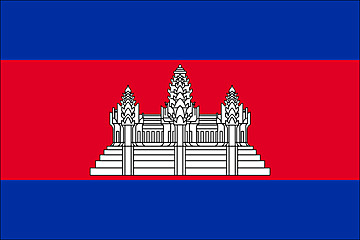Half of 2.4 Million Vietnamese Get IDs in Cambodia
News from Cambodia
Half of 2.4 Million Vietnamese Immigrants Said Given IDs by Cambodian Authority
SEP20071120021005
Phnom Penh Moneakseka Khmer in Cambodian
16 November 2007 [Report by Koet Samrech]
The commission for the census and registration of aliens living in Cambodia headed by Interior Ministry State Secretary Em Sam-an has started the census and registration of the aliens living in Cambodia since October 2006. So far more than a year has already elapsed but the commission has yet to show the result of the aliens' census and registration. Not just that, Interior Minister Sar Kheng seemed somewhat unwilling to show the number of aliens living in Cambodia, either legally and illegally.
A high-ranked Interior Ministry official who spoke on condition of anonymity said that the Interior Ministry might show the figures of the aliens living in Cambodia after the fourth national election to be held on 27 July 2008. The reason is that if these figures are revealed now the Cambodian People's Party [CPP] could be at a disadvantage because most of the aliens living in Cambodia are Vietnamese nationals who have illegally entered Cambodia and are supporters of the CPP. Besides, the majority of these Vietnamese immigrants have already voted for the CPP on several occasions so that they can live and work on Cambodian soil peacefully.
This high-ranked Interior Ministry official disclosed that the commission for the census and registration of aliens headed by Em Sam-an has conducted the census and registration of aliens in a number of provinces/cities where many aliens live. The work of this commission has led to the finding that the overwhelming majority of aliens living in Cambodia are Vietnamese immigrants. For this reason, the commission is afraid to publicly announce the result of the census. If the Interior Ministry dares to publicize the result of the census and registration of the aliens soon, various political parties and observers might question the political principles of the CPP in protecting the Vietnamese immigrants.
It should be noted that in May and June 2006 a Vietnamese magazine published that there were 300,000 Vietnamese nationals living in Cambodia. In making this announcement maybe this magazine wanted to point out that the Vietnamese immigrants can come and live in Cambodia freely. But almost immediately, the spokesman of the Interior Ministry claimed that there were only about 100,000 Vietnamese immigrants living in this country. The Interior Ministry spokesman's claim came under strong criticisms of many circles, which said that this was an intention to cover up the number of Vietnamese living in Cambodia because these Vietnamese have voted for the CPP.
A few months ago the Vietnamese association in Cambodia affirmed that a little more than 100,000 Vietnamese nationals lived in Cambodia and half of them had documents recognized by the Cambodian authority. Such a claim made by the Vietnamese association drew criticisms from a number of observers who said that the Cambodian authority cares more about the Vietnamese immigrants than about its own citizens. As a matter of fact, 50 percent of the Vietnamese immigrants living in Cambodia have documents recognized by the Cambodian authority while a large number of Cambodians have not yet been recognized by the Cambodian authority. Independent observers said that there are from 2 to 4 million Vietnamese immigrants in Cambodian these days, not just 300,000 as published by the Vietnamese magazine or just 100,000 as claimed by the Interior Ministry spokesman and the chairman of the Vietnamese association. To really know if it is true that millions of Vietnamese are living in Cambodia one needs to go look at the Chba Ampeou area in Meanchey district, Phnom Penh, and the Chhnok Tru area of Kampong Chhnang province. There, one is certain to be able to evaluate the real number of Vietnamese in Cambodia. This is because in both places the Vietnamese immigrants are living like colonies of ants and most of them carry papers recognized by the Cambodian authority.
The independent observers further said that at present more Vietnamese are continuing to pour into Cambodia in an anarchic mass through the border gates adjacent to Vietnam, especially through the Bavet border pass. These Vietnamese immigrants come in and take shelter under the label of the big Vietnamese association in Phnom Penh and its chapters in 19 Cambodian provinces and cities. The authorities at the border do not care about the future impact to the national society. They care only about lining their own pockets with bribes.
Some political figures have expressed great worry to see the influx of Vietnamese immigrants into Cambodia that looks like the current from a broken dam. The children of some Vietnamese immigrants are learning the Cambodian language and literature and are better read than most Cambodian children, the owners of the country. They are seeking to learn and understand the Cambodian culture, tradition, and mores in depth. Therefore, in the future, these Vietnamese kids will become Cambodian officials, civil servants, members of Parliament, and maybe senior government leaders.
These political figures noted that the fact that the Vietnamese association has opened courses to teach the Cambodian language and literature to its people who are living on Cambodian soil shows that the Vietnamese are having a specific scheme afoot. Our saying this should not be taken as racial discrimination or an attempt at breaking up the longstanding Cambodian-Vietnamese friendship. It is just an expression of concern, for the presence of millions of Vietnamese immigrants in Cambodia is not something good.
Recently the Cambodian Government headed by the megalomaniac Prime Minister Hun Sen was seriously thinking about resolving the border problem with Vietnam to the point that it set a timeframe for the implantation of the border markers between the two countries to be completed by the end of 2008. As for the settlement of the immigration issue that is so vital to the survival of Cambodia, Hun Sen does not care to resolve it anytime soon.

